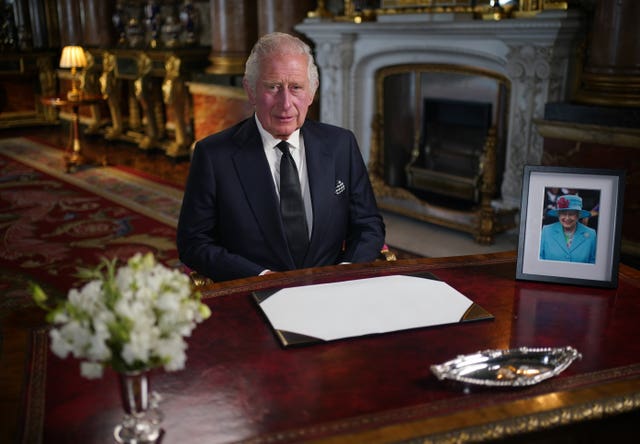William and Kate have become the new Prince and Princess of Wales, with the King announcing their titles in his historic address to the nation.
King Charles III set his affairs in order in a television broadcast on Friday evening, saying he was proud to bestow the title on his eldest son and heir.
It means William is following in his father’s footsteps, and Kate has become the first person since Diana, Princess of Wales to use the title, which Diana held when she was married to Charles.

Charles was created the Prince of Wales by the Queen when he was just nine years old, with the title belonging to him for more than 64 years.
A source close to the Waleses said: “The couple are focussed on deepening the trust and respect of the people of Wales over time.”
The title Prince of Wales has long been used for heirs to the throne as William, 40, is now, but it is not an automatic right, and is the choice of the sovereign to award it.
William and Kate lived in Wales for a time before they married and as newlyweds, spending several years in Anglesey, but will now make moves to strengthen their bond with the country.

They visited Cardiff with Prince George and Princess Charlotte during the Jubilee celebrations in June.
William was born Prince William of Wales, and was given the title the Duke of Cambridge by his grandmother the Queen when he wed in 2011.
As heir to throne, which he automatically became on the death of the Queen on Thursday, William’s royal duties will intensify, in support of his father and as he prepares for his own reign one day.
Charles paid tribute to “our new Prince and Princess of Wales”, saying they would “continue to inspire and lead our national conversations, helping to bring the marginal to the centre ground where vital help can be given”.
The King said: “As my heir, William now assumes the Scottish titles which have meant so much to me.
“He succeeds me as Duke of Cornwall and takes on the responsibilities for the Duchy of Cornwall which I have undertaken for more than five decades.
“Today, I am proud to create him Prince of Wales, Tywysog Cymru, the country whose title I have been so greatly privileged to bear during so much of my life and duty.
“With Catherine beside him, our new Prince and Princess of Wales will, I know, continue to inspire and lead our national conversations, helping to bring the marginal to the centre ground where vital help can be given.”

A source close to the Waleses added: “The Prince and Princess of Wales will approach their roles in the modest and humble way they’ve approached their work previously.
“The new Princess of Wales appreciates the history associated with this role but will understandably want to look to the future as she creates her own path.”
Camilla, the new Queen, was also technically the Princess of Wales when she married Charles in 2005 but never used the title because of its association with Diana, who died in a car crash in 1997.

Diana was stripped of her HRH style and her title was changed to Diana, Princess of Wales following her divorce the year before she died.
William and Kate are also the Duke and Duchess of Cornwall, and the Duke and Duchess of Rothesay in Scotland.
As Charles’s eldest son, William automatically inherited the title the Duke of Cornwall.
As the 25th Duke of Cornwall, William is entitled to the multimillion-pound annual net surplus from the Duchy of Cornwall landed estate.
The income will cover the cost of both his public and private life.
William also inherited the Scottish titles the Duke of Rothesay, Earl of Carrick, Baron of Renfrew, Lord of the Isles and Prince and Great Steward of Scotland.
– Duke of Rothesay – This title of the Scottish peerage was first conferred by Robert III, King of Scots, on his son David in 1398. An act of the Scottish Parliament in 1469 confirmed its restriction to the heir apparent to the throne of Scotland.
Since the 1603 Union of the Crowns, the title has descended alongside the Dukedom of Cornwall.
– Earl of Carrick and Baron of Renfrew – Other titles of the Scottish peerage inherited by the heir to the throne under the 1469 Act.
– Lord of The Isles – This ancient title, held by those who ruled the Western Isles as vassals of the King of Scotland, was annexed to the Crown by James V of Scotland in 1540, to be passed to his heirs.
– Prince and Great Steward of Scotland – The hereditary office of Great (or High) Steward dates from the 12th century. The 1469 Act confirmed that the title should go to “the first-born prince of the King of Scots for ever”.
The couple’s children are now Prince George, Princess Charlotte and Prince Louis of Wales.




Comments: Our rules
We want our comments to be a lively and valuable part of our community - a place where readers can debate and engage with the most important local issues. The ability to comment on our stories is a privilege, not a right, however, and that privilege may be withdrawn if it is abused or misused.
Please report any comments that break our rules.
Read the rules hereLast Updated:
Report this comment Cancel